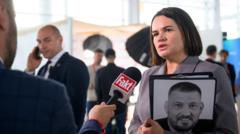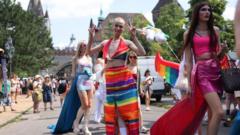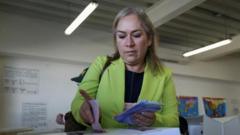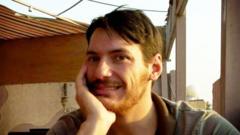Survivors of the Assad regime's brutality, René and Nujeen share their emotional journeys after escaping Syria. With Assad's fall, they express hope for a new era of freedom, but remain cautious about the future in a landscape still marred by violence and persecution.
"From Fear to Hope: Syrian Survivors Share Their Stories After Assad's Fall"
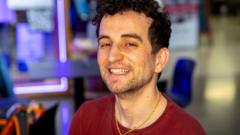
"From Fear to Hope: Syrian Survivors Share Their Stories After Assad's Fall"
As Bashar al-Assad's regime crumbles, Syrian refugees like René and Nujeen reflect on their harrowing pasts and their dreams for a brighter future.
René Shevan cradles a cherished music box, a remnant of a life lost in the chaos of war. This small artifact is a tangible connection to his home in Syria, a place filled with memories that were brought back into focus during recent political upheaval. After 12 years of exile and trauma stemming from his experience in a Syrian prison, René expresses a newfound willingness to confront his past publicly. “The republic of fear is gone,” he declares.
His journey has been marked by profound tragedy and resilience. René recalls the harrowing horrors of prison where he not only endured his own sexual assault but also witnessed the suffering of others. “There was a woman pleading, and I could see her being raped,” he shares, his voice trembling with emotion. His heartache is juxtaposed with elation as he welcomes the fall of Assad’s regime, perceiving it as a beacon of hope not just for himself but for all Syrians.
Similarly, Nujeen, a disabled Kurdish girl, reflects on her arduous journey to safety and the bittersweet relief of seeing the tyrant toppled. For Nujeen, the fall signals hope but also raises questions about the future for her community. Her laughter and dreams of becoming an astronaut serve as a stark reminder of hope amidst despair.
While there is a flicker of optimism, both young survivors acknowledge the daunting task ahead. They grapple with the potential for resurgence in violence against marginalized groups, including the LGBTQ+ community and Kurds, as old tensions may rear their head amidst a new regime. “We fought for a better future,” René emphasizes, acknowledging the cost of that struggle.
Nujeen voices concern for her family still in Syria, underscoring the persistent anxiety that lingers after such profound trauma. The uncertainty surrounding their safety and the fate of their homeland continues to burden their hearts even as they strive for a more inclusive and peaceful society.
Both René and Nujeen view their stories as part of a broader narrative of resilience, declaring that the essence of their experiences is rooted in love and acceptance. They believe that, despite their tumultuous past, the future holds the possibility of building a nation founded on compassion rather than fear. “We are not people who hate,” Nujeen affirms. “We can and will be a better nation - a nation of love, acceptance, and peace.”
The echoes of their past resonate deeply, but so does their steadfast hope for Syria’s future. With their voices finally freed, they join countless others in envisioning a better tomorrow for all Syrians.

